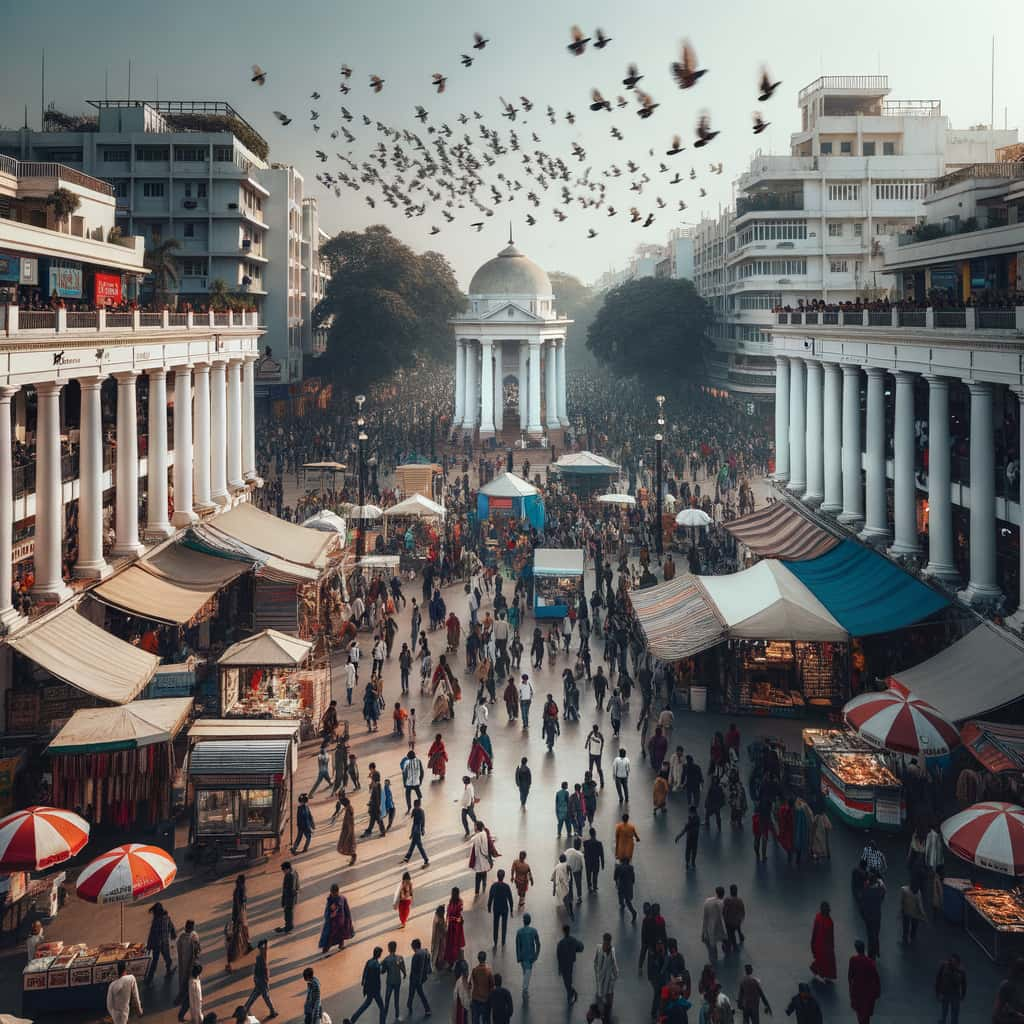For all of Australia’s manifest multiculturalism and tough anti-discrimination laws, the racist demon lurks, say academics, bureaucrats and students in Melbourne.
Bumper stickers on cars in Melbourne proudly proclaim that the State of Victoria is “the place to be”. Kanan Kharbanda, however, wishes he’d been in any place other than Victoria last year, when he lost his vision in his right eye after being pummelled by a street gang one night at a Melbourne suburban railway station.
The 27-year-old student of accounting at the Melbourne Institute of Technology was with his friend at a taxi rank in Sunshine, the low-income western suburb of Melbourne, when a multi-ethnic gang of youngsters came up and demanded money. When he said he hadn’t any, he told DNA, they beat him up, and hurled racial abuses. “They had knuckledusters on,” he remembers. His facial bones were broken, and the optic nerve of his right eye was severed, rendering him blind for life in that eye.
Kharbanda is only one of many Indian students in Australian cities who have been victims of street violence by young offenders in recent months. The attacks drew unflattering attention to Australia in the world media, including the charge that Australian civil society, for all its manifest multiculturalism and success in integrating waves of immigrants over the decades, perhaps nursed a racist streak.
“Some of these attacks were undoubtedly motivated by racist elements,” Victoria Police Chief Commissioner Simon Overland says. “But it’s not just Indians, even Chinese students are overrepresented among the victims of street crimes.” However, he adds, many of these were also ‘opportunistic crimes’ on ‘vulnerable victims’. “Many Indian students are struggling financially and tend to live in poor neighbourhoods… They also work casual jobs to support themselves, and work late nights,” which puts them in the wrong place at the wrong time, he adds.
Australian social scientists, however, say it a lot more bluntly. “Racism runs deep in… Australia,” says Sandy Gifford, professor in the school of social sciences at La Trobe University. “It is shameful that we are pussyfooting around the current violence with responses directed at the victims.”
Police narratives that “blame the victims” for the violence — by claiming, as one officer did, that Indian students “spoke loudly in their native languages” — were “dangerous, subjective perceptions,” cautions Stephan Kerkyasharian, chairman of the Community Relations Commission, which works to promote multiculturalism in New South Wales and who has been appointed to head a working committee to offer practical suggestions for Indian and other international students in Australia. “That’s a ridiculous thing to say.”
Peter Gale, senior lecturer in Australian studies at the University of South Australia, too says he finds it “disturbing” that “we’re focussing on the behaviour of Indian students rather than on what can be done… to put in place a more inclusive environment for Indian (and other international) students.” But although Australia has in the past 10 years or so received a bad press internationally, it “actually has a very good record in terms of being a welcoming country over a 50-year period.” Nearly 60 per cent of Australia’s population was either born overseas or has one parent or grandparent who was born overseas, he points out.
Since the Second World War, and particularly after it abandoned its ‘white
Australia’ policy in the 1970s, Australia has gradually become more welcoming of immigrants, and although there have been periodic outbursts of racial bigotry from Conservative and far-right politicians, Australian politics has by and large maintained a semblance of balance. And last year, Prime Minister Kevin Rudd offered a historic apology on behalf of the nation to Australia’s indigenous aboriginal population, saying that the move was necessary for people to “reconcile the past with their future”.
Yet, for all its success, race relations occasionally come under strain, and visibly so — and not just from Indian students, either. Last month, Sol Trujillo, a Mexican who stepped down as CEO of Australian telecom company Telco, damned Australia as “racist” and “backward”. Australia’s immigration policies, he said, were “out of step with the modern world”, and going to Australia felt like “stepping back in time”.
Kerkyasharian concedes that “it is a fact of life that you will have people who pursue a racist agenda”, but denies that “there is endemic racism in Australia.” In fact, he points out, Australia has one of the toughest anti-discrimination laws in the world. And the federal government has initiated efforts to outlaw “hate crimes” and invocations of racially inflammatory rhetoric. The only thing that now needs to be done is for all Australians to “stop denigrating diversity” and accept “the reality of multiculturalism”.
![submenu-img]() US imposes sanctions on Chinese, Belarus firms for providing ballistic missile tech to Pakistan
US imposes sanctions on Chinese, Belarus firms for providing ballistic missile tech to Pakistan![submenu-img]() 'Don't have any comment': White House mum on reports of Israeli strikes in Iran
'Don't have any comment': White House mum on reports of Israeli strikes in Iran![submenu-img]() Yes Bank co-founder Rana Kapoor gets bail after four years in bank fraud case
Yes Bank co-founder Rana Kapoor gets bail after four years in bank fraud case![submenu-img]() Barmer Lok Sabha Polls 2024: Check key candidates, date of voting and other important details
Barmer Lok Sabha Polls 2024: Check key candidates, date of voting and other important details![submenu-img]() This star once lived in garage, earned Rs 51 as first salary; now charges Rs 5 crore per film, is worth Rs 335 crore
This star once lived in garage, earned Rs 51 as first salary; now charges Rs 5 crore per film, is worth Rs 335 crore![submenu-img]() DNA Verified: Is CAA an anti-Muslim law? Centre terms news report as 'misleading'
DNA Verified: Is CAA an anti-Muslim law? Centre terms news report as 'misleading'![submenu-img]() DNA Verified: Lok Sabha Elections 2024 to be held on April 19? Know truth behind viral message
DNA Verified: Lok Sabha Elections 2024 to be held on April 19? Know truth behind viral message![submenu-img]() DNA Verified: Modi govt giving students free laptops under 'One Student One Laptop' scheme? Know truth here
DNA Verified: Modi govt giving students free laptops under 'One Student One Laptop' scheme? Know truth here![submenu-img]() DNA Verified: Shah Rukh Khan denies reports of his role in release of India's naval officers from Qatar
DNA Verified: Shah Rukh Khan denies reports of his role in release of India's naval officers from Qatar![submenu-img]() DNA Verified: Is govt providing Rs 1.6 lakh benefit to girls under PM Ladli Laxmi Yojana? Know truth
DNA Verified: Is govt providing Rs 1.6 lakh benefit to girls under PM Ladli Laxmi Yojana? Know truth![submenu-img]() Remember Ali Haji? Aamir Khan, Kajol's son in Fanaa, who is now director, writer; here's how charming he looks now
Remember Ali Haji? Aamir Khan, Kajol's son in Fanaa, who is now director, writer; here's how charming he looks now![submenu-img]() Remember Sana Saeed? SRK's daughter in Kuch Kuch Hota Hai, here's how she looks after 26 years, she's dating..
Remember Sana Saeed? SRK's daughter in Kuch Kuch Hota Hai, here's how she looks after 26 years, she's dating..![submenu-img]() In pics: Rajinikanth, Kamal Haasan, Mani Ratnam, Suriya attend S Shankar's daughter Aishwarya's star-studded wedding
In pics: Rajinikanth, Kamal Haasan, Mani Ratnam, Suriya attend S Shankar's daughter Aishwarya's star-studded wedding![submenu-img]() In pics: Sanya Malhotra attends opening of school for neurodivergent individuals to mark World Autism Month
In pics: Sanya Malhotra attends opening of school for neurodivergent individuals to mark World Autism Month![submenu-img]() Remember Jibraan Khan? Shah Rukh's son in Kabhi Khushi Kabhie Gham, who worked in Brahmastra; here’s how he looks now
Remember Jibraan Khan? Shah Rukh's son in Kabhi Khushi Kabhie Gham, who worked in Brahmastra; here’s how he looks now![submenu-img]() DNA Explainer: What is cloud seeding which is blamed for wreaking havoc in Dubai?
DNA Explainer: What is cloud seeding which is blamed for wreaking havoc in Dubai?![submenu-img]() DNA Explainer: What is Israel's Arrow-3 defence system used to intercept Iran's missile attack?
DNA Explainer: What is Israel's Arrow-3 defence system used to intercept Iran's missile attack?![submenu-img]() DNA Explainer: How Iranian projectiles failed to breach iron-clad Israeli air defence
DNA Explainer: How Iranian projectiles failed to breach iron-clad Israeli air defence![submenu-img]() DNA Explainer: What is India's stand amid Iran-Israel conflict?
DNA Explainer: What is India's stand amid Iran-Israel conflict?![submenu-img]() DNA Explainer: Why Iran attacked Israel with hundreds of drones, missiles
DNA Explainer: Why Iran attacked Israel with hundreds of drones, missiles![submenu-img]() This star once lived in garage, earned Rs 51 as first salary; now charges Rs 5 crore per film, is worth Rs 335 crore
This star once lived in garage, earned Rs 51 as first salary; now charges Rs 5 crore per film, is worth Rs 335 crore![submenu-img]() Meet actress, who worked as cook for free food, mopped floors, one Instagram post changed her life, is now worth…
Meet actress, who worked as cook for free food, mopped floors, one Instagram post changed her life, is now worth… ![submenu-img]() UP man arrested for booking cab from Salman Khan's house under Lawrence Bishnoi's name
UP man arrested for booking cab from Salman Khan's house under Lawrence Bishnoi's name ![submenu-img]() 'Justice milega': Ankita Lokhande talks about Sushant Singh Rajput, reveals she's still connected with his family
'Justice milega': Ankita Lokhande talks about Sushant Singh Rajput, reveals she's still connected with his family![submenu-img]() Rajkummar Rao reacts to plastic surgery rumours, admits he got fillers: 'If something gives me confidence...'
Rajkummar Rao reacts to plastic surgery rumours, admits he got fillers: 'If something gives me confidence...'![submenu-img]() IPL 2024: KL Rahul, Quinton de Kock star in Lucknow Super Giants' dominating 8-wicket win over Chennai Super Kings
IPL 2024: KL Rahul, Quinton de Kock star in Lucknow Super Giants' dominating 8-wicket win over Chennai Super Kings![submenu-img]() DC vs SRH, IPL 2024: Predicted playing XI, live streaming details, weather and pitch report
DC vs SRH, IPL 2024: Predicted playing XI, live streaming details, weather and pitch report![submenu-img]() Watch: Virat Kohli's cheeky 'your wife' remark to Dinesh Karthik leaves RCB teammates in splits
Watch: Virat Kohli's cheeky 'your wife' remark to Dinesh Karthik leaves RCB teammates in splits ![submenu-img]() DC vs SRH IPL 2024 Dream11 prediction: Fantasy cricket tips for Delhi Capitals vs Sunrisers Hyderabad
DC vs SRH IPL 2024 Dream11 prediction: Fantasy cricket tips for Delhi Capitals vs Sunrisers Hyderabad![submenu-img]() 'Kohli said it's not an option, just...': KL Rahul recalls his IPL debut for RCB in 2013
'Kohli said it's not an option, just...': KL Rahul recalls his IPL debut for RCB in 2013![submenu-img]() Canada's biggest heist: Two Indian-origin men among six arrested for Rs 1300 crore cash, gold theft
Canada's biggest heist: Two Indian-origin men among six arrested for Rs 1300 crore cash, gold theft![submenu-img]() Donuru Ananya Reddy, who secured AIR 3 in UPSC CSE 2023, calls Virat Kohli her inspiration, says…
Donuru Ananya Reddy, who secured AIR 3 in UPSC CSE 2023, calls Virat Kohli her inspiration, says…![submenu-img]() Nestle getting children addicted to sugar, Cerelac contains 3 grams of sugar per serving in India but not in…
Nestle getting children addicted to sugar, Cerelac contains 3 grams of sugar per serving in India but not in…![submenu-img]() Viral video: Woman enters crowded Delhi bus wearing bikini, makes obscene gesture at passenger, watch
Viral video: Woman enters crowded Delhi bus wearing bikini, makes obscene gesture at passenger, watch![submenu-img]() This Swiss Alps wedding outshine Mukesh Ambani's son Anant Ambani's Jamnagar pre-wedding gala
This Swiss Alps wedding outshine Mukesh Ambani's son Anant Ambani's Jamnagar pre-wedding gala








































)




)
)
)
)
)
)